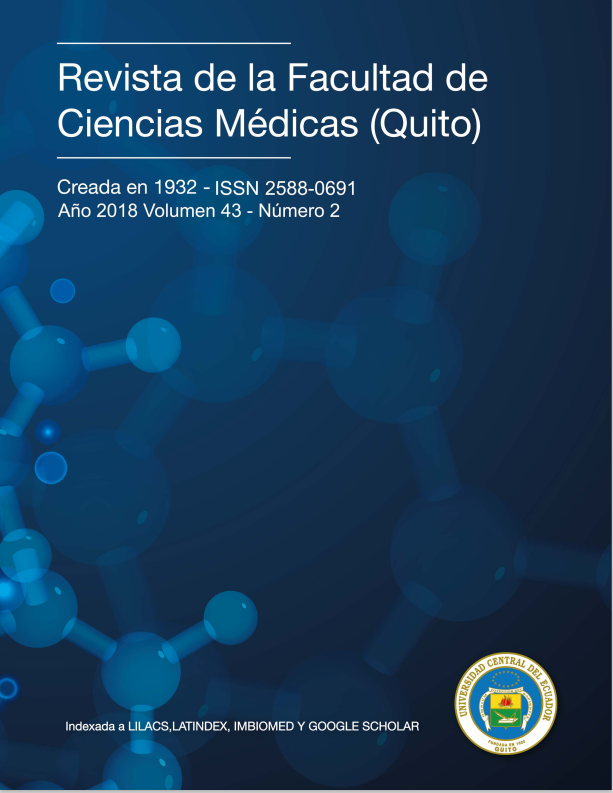Sleep quality and sleep hygiene in undergraduate students: a comparison between the first and the last year at medical school in Quito, Ecuador
DOI:
https://doi.org/10.29166/rfcmq.v43i2.2819Palabras clave:
Sleep deprivation, sleep hygiene, medical students, daytime sleepiness, medical school, sleep disorders, circadian rhythm, sleep wake disorders, pittsburgh sleep quality indexResumen
Aim: to analyze the quality of sleep with the total Pittsburgh Sleep Quality Index PSQI, among the first and last year students of the medical school. Methods: epidemiologic, observational, and cross-sectional with two cohorts of individuals, performed at the Faculty of Medical Sciences at Central University of Ecuador, in Quito, Ecuador, during 2017. Sample size was of 401 individuals. 239 first year students and 162 last year students (internship), with non-probabilistic sampling. The PSQI was applied in its Spanish version consisting of 19 items. Results: 81.17% of respondents of first-year are bad sleepers while in the group of last year students are 90.12%. The sleep duration factor has an average of 2.11 with a standard deviation of 0.80; the asymmetry is negative (-0.58), which indicates that the values are grouped to the right of the arithmetic mean, revealing that respondents sleep less than six hours a day. Conclusion: It found that 90.12% of senior students (internship) and 81.17% of first year students are bad sleepers, 83.26% of first year students and 79.63% of senior year (internship) presented sleep duration of less than six hours, accompanied by night awakenings and daytime sleepiness. 45.61% of the first-year students and 61.73% of the internship perceived poor warm sleep. A moderate correlation value of r=0.549 was obtained between the total PSQI and the daytime sleep dysfunction in the internship students, while the first year students sleep duration reached a correlation of r=0.598.
Descargas
Métricas
Citas
Cvejic E, Huang S, Vollmer-Conna U (2018) Can you snooze your way to an ‘a’? Exploring the complex relationship between sleep, autonomic activity, wellbeing and performance in medical students.
Aust N Z J Psychiatry 52(1):39–46. https://doi.org/10.1177/0004867417716543.
Owens JA, Weiss MR. Insufficient sleep in adolescents: causes and consequences. Minerva Pediatr.
Aug;69(4):326-336. doi:10.23736/S0026-4946.17.04914-3.
Joffre CP, Delgado B, Kosik RO, et al. Medical education in Ecuador. Med Teach. 2013;35(12):979–
doi:10.3109/0142159X.2013.826789
Alsaggaf MA, Wali SO, Merdad RA, Merdad LA. Sleep quantity, quality, and insomnia symptoms of medical students during clinical years. Relationship with stress and academic performance. Saudi
Med J. 2016 Feb;37(2):173-82. doi: 10.15537/smj.2016.2.14288.
Patrick Y, Lee A, Raha O, Pillai K, Gupta S, Sethi S, Mukeshimana F, Gerard L, Moghal MU, Saleh SN,
Smith SF, Morrell MJ, Moss J. Effects of sleep deprivation on cognitive and physical performance in
university students. Sleep Biol Rhythms. 2017;15(3):217-225. doi: 10.1007/s41105-017-0099-5.
Purim KS, Guimarães AT, Titski AC, Leite N. Sleep deprivation and drowsiness of medical residents and medical students. Rev Col Bras Cir. 2016 Dec;43(6):438-444. Portuguese. English. doi:
1590/0100-69912016006005.
Wolf MR, Rosenstock JB. Inadequate Sleep and Exercise Associated with Burnout and Depression
Among Medical Students. Acad Psychiatry. 2017 Apr;41(2):174-179. doi: 10.1007/s40596-016-0526-y.
Pérez-Olmos I, Ibáñez-Pinilla M. Night shifts, sleep deprivation, and attention performance in medical students. Int J Med Educ. 2014 Mar 29;5:56-62. doi: 10.5116/ijme.531a.f2c9.
Bhandari PM, Neupane D, Rijal S, Thapa K, Mishra SR, Poudyal AK. Sleep quality, internet addiction and depressive symptoms among undergraduate students in Nepal. BMC Psychiatry. 2017 Mar
;17(1):106. doi: 10.1186/s12888-017-1275-5.
Ruano C, Lucumi E, Albán J, Arteaga S, Fors M. Obesity and cardio-metabolic risk factors in Ecuadorian university students. First report, 2014-2015. Diabetes Metab Syndr. 2018;12(6):917–921.
doi:10.1016/j.dsx.2018.05.015
Johnson KM, Simon N, Wicks M, Barr K, O’Connor K, Schaad D. Amount of Sleep, Daytime Sleepiness, Hazardous Driving, and Quality of Life of Second Year Medical Students. Acad Psychiatry. 2017
Oct;41(5):669-673. doi:10.1007/s40596-017-0668-6.
Webb JR, Thomas JW, Valasek MA. Contemplating cognitive enhancement in medical students and
residents. Perspect Biol Med. 2010 Spring;53(2):200-14. doi: 10.1353/pbm.0.0154.
Pikovsky O, Oron M, Shiyovich A, Perry ZH, Nesher L. The impact of sleep deprivation on sleepiness, risk factors and professional performance in medical residents. Isr Med Assoc J. 2013
Dec;15(12):739-44.
Givaty G. Sleep deprivation among medical residents: different perspectives. Isr Med Assoc J. 2013
Dec;15(12):768-9.
Rao WW, Li W, Qi H, et al. Sleep quality in medical students: a comprehensive meta-analysis of
observational studies [published online ahead of print, 2020 Feb 18]. Sleep Breath. 2020;10.1007/
s11325-020-02020-5. doi:10.1007/s11325-020-02020-5
Mollayeva T, Thurairajah P, Burton K, Mollayeva S, Shapiro CM, Colantonio A. The Pittsburgh sleep
quality index as a screening tool for sleep dysfunction in clinical and non-clinical samples: A systematic review and meta-analysis. Sleep Med Rev. 2016;25:52–73. doi:10.1016/j.smrv.2015.01.009
Buysse DJ, Reynolds CF 3rd, Monk TH, Berman SR, Kupfer DJ. The Pittsburgh Sleep Quality Index: a new instrument for psychiatric practice and research. Psychiatry Res. 1989;28(2):193–213.
doi:10.1016/0165-1781(89)90047-4
Descargas
Publicado
Cómo citar
Número
Sección
Licencia
Derechos de autor 2017 Marcia Zapata-Mora, Pablo Curay, Fernando Palacios, Marlene Delgado, Damian Palacios, Gabriela Aguinaga-Romero, Fabricio Gonzalez-Andrade

Esta obra está bajo una licencia internacional Creative Commons Atribución-NoComercial-SinDerivadas 4.0.










